24th April 1919
Bugs Kept at Bay
All material produced or reproduced here and throughout this work is the sole copyright of the author and the family of Doctor D.C.M. Page MC
“On April 24th I moved into a new billet. I got a room in a very pleasant, clean house close to our hospital. The owners of the house were a young married couple, the husband being a motor engineer (marine). I took the precaution to make my bed bug-proof – I pulled it out from the wall, and immersed the legs in tins full of water. I was very comfortable in this billet, and my landlady was very kind. She gave me a cup of tea every morning before I went out, and often at night invited me to drink tea in their room. Of course, I had all my meals at the mess round the corner.”
Find out about our connection with Dr Page and an introduction to his diary here
19th April 1919 Saturday
Standing Room only and Rascally Priests
All material produced or reproduced here and throughout this work is the sole copyright of the author and the family of Doctor D.C.M. Page MC
“On Saturday, April 19th, the cars stopped running on the frozen river between our island of Solombola and Archangel, as the ice is expected to break up any day now. A wooden track was laid across the river for the use of pedestrians. At 11.30 p.m. Lt. Herman, Capt. Steuart and I went along to the Russian Church in Solombola to attend the midnight service. The church was absolutely packed full of people, but we managed to squeeze in somehow or other. There are no chairs, or seats of any description in Russian churches, and the whole floor space of this large church was crowded with all sorts of Russians, male and female, old and young. The crowds outside kept shoving and pushing in all during the service, and my toes and back suffered severely. It was more like a free fight, or one of Patrick Thomson’s cheap sales, than a church service. Everybody was buying candles at a stall just inside the main door. They lit them, and put one in front of one or other of the many ikons dotted about the church interior. Each worshipper also held a lighted candle or two in his or her hand, so that the heat inside the building soon become well-nigh unendurable. The smell of burning candles was sickening too, and my coat was soon festooned with candle grease! At midnight the altar doors opened, and a procession of rascally-looking priests entered. They marched, or rather elbowed their way through the mob in the body of the church, to the main entrance, where they left the church, and walked round the building outside with lighted candles. As they passed through the church they chanted a dismal ditty, and everybody tried to light their candles from those of the priests. It was a rare old scramble, and I was tossed about like a cork on a stormy sea. On the return of the priests all the electric lights were switched on, and the heat got worse. A mixed choir sang some lovely music whilst the priests visited the ikons. When we left at 1 a.m. the crowds were still in the church burning candles, moaning and crossing themselves. The church bells rang all night. It is an Eastertime custom in Russia to greet one’s friends with ‘Krasni Kress’ (Christ is Risen), and then embrace and kiss. When we left the church the streets were crowded with people (there was a special extension of the curfew order), and Steuart tried this on with one of his Barishna friends. He got his face soundly slapped for his trouble!
It snowed very heavily all that night, and lay about a foot deep next day.”
Find out about our connection with Dr Page and an introduction to his diary here
12th April 1919 Saturday
The Thaw Begins but No Let Up for the 85th General
All material produced or reproduced here and throughout this work is the sole copyright of the author and the family of Doctor D.C.M. Page MC
“On Saturday, April 12th, it rained for the first time this year. It was very dull and mild all day, and the snow disappeared rapidly all day. One had to wade through about a foot of water in the streets. Two days after this we were able to bask in the sun after lunch. There appears to be no spring out here, but a rapid change from hard frost, and biting winds, to sunny skies, and warm days. Of course the ground was still white – a dirty white now – with snow, and the river still blocked up with ice.
Things got busier than ever in our hospital. Convoys of wounded and sick arrived almost every day. The operating theatre was very busy, and we were often at work in there till late on at night.”
Find out about our connection with Dr Page and an introduction to his diaries here
9th April 1919 Wednesday
A Crash Course and Be Nice to The Russians!
All material produced or reproduced here and throughout this work is the sole copyright of the author and the family of Doctor D.C.M. Page MC
“On Wednesday, April 9th, there was a meeting of the Allied Medical Society, in our hospital which was a great success. Col. Richmond, our O.C. read a paper on ‘Aeroplane Crashes’, which was very well received. The guests afterwards inspected the hospital, and took tea with us. At night I attended a mass meeting of British officers in Archangel, when the Base Commandant – Col. Crosbie – lectured us on our attitude to the Russians. He was very good, but, of course, his remarks did not apply to the majority of us, but only to a very few, who had evidently been drinking heavily o’ nights, and then denouncing the Russians as lazy, dirty swine etc., remarks, doubtless true when applied to the Russians we meet in Archangel, but perhaps best left unsaid.”
Col. James Dayrolles Crosbie had been Commanding Officer of the 16thBattalion Queen’s Royal West Surrey Regiment until the Armistice on the 11thNovember 1918. He was then sent out to Archangel to take over as Base Commandant, where his work would entail relieving Brigadier-General Henry Needham, the Administrative Staff Officer, of a lot of his work.
The son of local nobility he was born in Co. Kerry, Ireland in 1865. As a young man he was destined for high office, by 1894 he had been appointed to the post of High Sheriff of County Kerry. Educated at Harrow, he chose a career in the military and in 1885 received his first commission in the 2nd battalion Royal Welch Fusiliers studying at the Royal Military College, Sandhurst. He relinquished his military career in 1893 and married Maria Caroline Leith the daughter of Major James Leith V.C. in 1894.
He sold his castle home in Kerry in 1912 but the outbreak of war in 1914 saw Crosbie resume his military career commanding the 11th Battalion Lancashire Fusiliers then 16th Battalion QRWS reaching the rank of T. Brigadier-General. Also, in 1919 he was made Companion, Order of St. Michael and St. George (C.M.G). He was Deputy Lieutenant County Kerry and Justice of the Peace.
He had settled in Scotland at Muircambus House, Kilconquhar, East Fife, which by some coincidence was about six miles from where Captain Douglas Page had established his general practice in Pittenween, Fife, long after his military service had ended. It is entirely possible, as Dr Page’s practice covered a wide area that Crosbie was a patient of his.
Known as “The General” Crosbie had then become Chairman of Fife County Council between 1938 and 1945 so he would have been well known to Dr. Page throughout the rest of his life. He finally passed away in December 1947 aged 83.
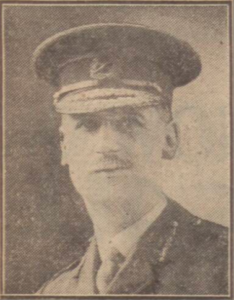
Brig-General Crosbie. Dundee Courier, 2nd November 1932 © D.C.Thomson & Co. Ltd. Image created courtesy of THE BRITISH LIBRARY BOARD. https://www.britishnewspaperarchive.co.uk/
Find out about our connection with Dr Page and an introduction to his diaries here
30th March 1919 Sunday
Fine Singing and Chopped off Fingers
All material produced or reproduced here and throughout this work is the sole copyright of the author and the family of Doctor D.C.M. Page MC
“On Sunday March 30th I went to a concert in the Duma. It was given by a huge choir (Russian) of mixed voices, and was very excellent. There was no accompaniment of any sort. The sole tenor was in excellent form. The hall was crowded, and very hot.
During all these days I was kept busy in my wards. Wounded and sick men were continually being admitted, and my wards were always full. Sometimes I had to pack as many as 40 patients into one ward. Many cases of frost-bite came in for treatment. Some were very bad, necessitating amputation of toes, or fingers. Major Jamieson, our surgeon, was kept busy in the operating theatre. He appointed me his assistant, and occasionally I was given a minor operation to perform.”
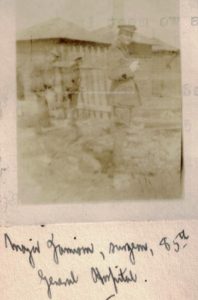
Find out about our connection with Dr Page and an introduction to his diaries here
26th March 1919 Wednesday
Portraits and Curfew
All material produced or reproduced here and throughout this work is the sole copyright of the author and the family of Doctor D.C.M. Page MC
“Next day, another officer and myself, had our photographs taken by a Russian photographer in Archangel. The photographer looked like a prize-fighter, and demanded 75 roubles from each of us, before he would risk his camera on us! Major Baxter of the Medical Stores told me that we were all going home in June. I hope the news comes true. Notices were posted over Archangel warning all civilians to be indoors by 10 p.m.”
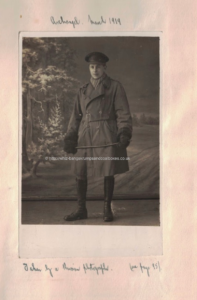
Find out about our connection with Dr Page and an introduction to his diary here
25th March 1919 Tuesday
Kennedy on the Khalyan and Disconcerting News
All material produced or reproduced here and throughout this work is the sole copyright of the author and the family of Doctor D.C.M. Page MC
“On Tuesday March 25th many alarming pieces of news came to my ears, and I seriously began to wonder whether I would ever see ‘Blighty’ again. I paid a visit to the hospital ship in the afternoon to see Kennedy. Now he is a brother Scot and I thought that he might cheer me up a bit with his conversation, belonging, as he does, like myself, to Auld Reekie. Instead of cheering me up, he put the ‘wind up’ me properly. He told me that a party of over 1000 Bolsheviks were marching on Solombola from the direction of Murmansk with 5000 rifles and 17 machine guns. Some of them he said, were already in Solombola, and on a given date, they were to blot out all British and Russian officers, and then invite the troops to revolt. He also told me that our great attack on the Bolsheviks on the Railway Front had failed completely, and that we had lost four officers killed, and 400 other ranks killed and wounded. Ten shots, he said, had been fired on British monitors at Solombola last night (I heard them), and three civilians had been murdered in the Archangel streets by Bolos. last night. Needless to say, I was most depressed when I left the hospital ship, but the arrival of a small mail from Blighty at night brightened matters up again considerably.”
Find out about our connection with Dr Page and an introduction to his diary here
24th March 1919 Monday
Commander Richardson appears again
All material produced or reproduced here and throughout this work is the sole copyright of the author and the family of Doctor D.C.M. Page MC
“Whilst in Archangel I met Lt. Commander Richardson, who was in hospital at the same time as myself. His language was as choice as ever, and some of his yarns very tall. He told me about a certain standard ship which was on her way out here loaded up with stores. She was held up by the ice in the White Sea, and was taking in four feet of water per hour. Ice-breakers had been rushed out to her relief, but it looks very like a hopeless business. Richardson tried to cheer me up by telling me that affairs at home were much worse than in Archangel! What a life!”
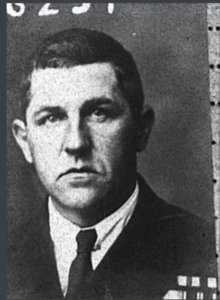
Edward Henry Richardson
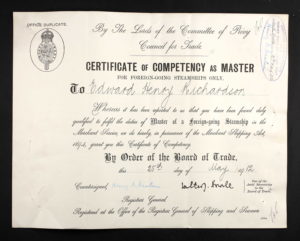
For more information on Commander Richardson please visit the entry for 16thDecember 1918 or click here
Find out about our connection with Dr Page and an introduction to his diary here
23rd March 1919 Sunday
Archangel Gets Jittery
All material produced or reproduced here and throughout this work is the sole copyright of the author and the family of Doctor D.C.M. Page MC
“The following day was ‘Windy Sunday’. Another officer and myself took a walk along to Archangel in the afternoon, and had tea at the Officers’ Club. On the way we saw a lot of the Civil Guard and cadets at drill. The Russians in Archangel who are loyal to the British fear an uprising of the Bolshevik element at any moment. We were informed that yesterday two hundred Bolos had been rounded up and arrested in Archangel. One of those arrested was the leader of the Duma – the local Lord Provost! Many machine-guns and lots of ammunition were found in various houses. We saw a big crowd gathered outside the Duma buildings, where the election of a new leader was going on. We were also told that the Russians are tired of having the British in Archangel, and want us to clear out, and let them manage their own affairs. That’s what I feel like too, for the whole lot of them are just a collection of dirty, diseased Bolsheviks – a two-faced lot, who eat our food, and say nice things to us at present, but who would denounce us to the enemy without thinking twice about it.
The Assistant Provost Marshall of Archangel, who dined with us at night, told us some thrilling stories of his adventures with the Bolos. He has been fired at nine times now at night, and seems to lead a charmed life. On the last occasion he was stepping on to the gangway of the hospital ship “Khalyan” where he was going to dinner, when he was shot at.
Towards eight o’clock things got more alarming and the ‘wind rose’. Some of our men came in with tales of shooting going on in Archangel. The A.P.M. departed in haste armed to the teeth, and we posted an armed sentry (R.A.M.C.) outside the mess door. The British Naval Units in Solombola ‘stood to’ all night, but nothing very alarming happened.”
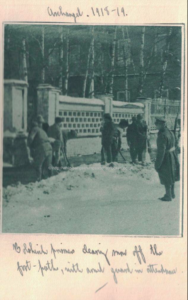
Bolshevik prisoner working party
Find out about our connection with Dr Page and an introduction to his diary here
22nd March 1919 Saturday
Flag Day!
All material produced or reproduced here and throughout this work is the sole copyright of the author and the family of Doctor D.C.M. Page MC
“On Saturday March 22nd there was a Flag Day in Archangel and Solombola. A flag-day of all things! I thought all that sort of thing had been left behind in Blighty. Anyhow I was touched for three roubles! What the flag-day was for I know not. I hope it was in aid of the Society for Cutting and Cleaning the Hair and Beards of Russian Priests!”
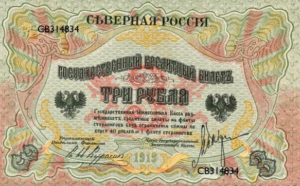
Sample of a 1919 3 Ruble banknote.
This was a period of hyper Inflation and put in context for the period of March 1919 £1 would get you about 400 rubles. 3 rubles was worth about 2d or 1p in modern UK money. It is impossible to give an exact rate of exchange as the rate was changing daily. Wages were often paid in kind with a sort of barter currency worth more than the paper money.
Find out about our connection with Dr Page and an introduction to his diary here